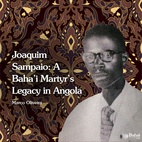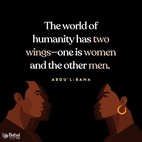The views expressed in our content reflect individual perspectives and do not represent the authoritative views of the Baha'i Faith.
Healing is a crucial component of the Baha’i year of waiting, regardless of whether the couple achieves the primary goal of reconciling and rebuilding their marriage.
Since harmony, unity and love are held up in the Baha’i teachings as the highest ideals in human relationships, when a marriage produces the opposite effects we need time to heal. While everyone’s experience is different, and the severity of the issues that lead to the break-up of a marriage can vary widely, it cannot be denied that there is trauma involved in any major marital conflict or separation. This trauma must first be recognized as such, and then worked through.
Being physically apart during the Baha’i year of waiting – also called a year of patience – allows for that process to occur. Abdu’l-Baha, the son and successor of Baha’u’llah, the prophet and founder of the Baha’i Faith, described the year of waiting this way:
They must strictly refrain from divorce unless something arises which compels them to separate because of their aversion for each other, then with the knowledge of [the Local Spiritual Assembly] they may decide to separate. They must then be patient and wait a year. If during this year harmony is not re-established between them then their divorce may be realized.
When my wife and I entered into our year of separation, I learned a great deal, not only about our relationship and its impacts, but about myself.
RELATED: The Benefits of Waiting Before Divorce
What I Realized During My Year of Waiting
In my own marriage, the idea that I had been traumatized was difficult for me to accept at first. For nearly two decades I had been dealing with one overarching marital issue — our different religions — and I saw it as my Baha’i duty to accept with radiant acquiescence whatever difficulties this brought on.
During the year of waiting, I finally realized that, while in retrospect I would not have changed my attitude, I had nonetheless experienced a low level of sustained emotional abuse over a long period of time. Because I was alone, separated from my wife, and compelled to contemplate what led me to this point, I reflected on the dynamics of our relationship more than I ever had before. During those moments of reflection I would remember specific situations and it would suddenly occur to me how bizarre, and indeed unjust, they had been. This in turn caused strong feelings of resentment to well up within me.
I felt fortunate to have a number of close friends, both male and female, who helped me through this difficult time in countless ways. When I confided in one of these friends that I was going through occasional bouts of resentment, she said, “Good. You need to go through that. Get resentful. Really feel the resentment. Then let it go.” I followed this wise advice: when some memory came up that created resentment in me, I fully embraced it, got angry about it, realized I no longer had to deal with it, felt a sense of relief, and then let it go.
I’m not saying that all trauma can be dealt with through such a simple process. As I stated before, my ex-wife is a good person, and I was (and remain) convinced that whatever negative treatment I received at her hands was neither intentional nor malicious. I’m nowhere near perfect myself, so far be it from me to suggest that I did not unintentionally visit similar treatment on her. But intention and impact are two different things, and I had to acknowledge and confront any feelings I might have, out of necessity, suppressed during the marriage. I would like to believe that the year of waiting has been helpful to my former spouse as well.
Reflecting on the Past, Preparing for the Future
Part of the healing process during the year of waiting involves reflecting on our own past actions. This includes asking tough questions such as, What was my role in the deterioration and eventual breakup of the marriage? What are some problematic behaviors that I can identify within myself that I do not wish to carry into my reconciled marriage or, failing that, any possible future relationship? This is where the real psychological and spiritual inner work begins.
That spiritual labor can produce reconciliation of a different kind — the accounting kind. Baha’u’llah, in his short book of spiritual aphorisms The Hidden Words, wrote:
O Son of Being! Bring thyself to account each day ere thou art summoned to a reckoning; for death, unheralded, shall come upon thee and thou shalt be called to give account for thy deeds.
What does it mean to bring ourselves to account? Do we address only our inner weaknesses, our debits? Or do we have credits as well, manifested as strengths? Can we use our strengths to overcome our weaknesses? If so, we should not overlook them, and be sure to include them in our accounting.
Of all the processes that take place during the year of waiting, perhaps this internal work is the most important, and it must be thorough. It is much easier to fix a car while it is parked in the garage than when it is driving on the road; likewise, the year of waiting is the perfect opportunity to address tendencies and behaviors within ourselves that are not conducive to sustaining a healthy relationship. Even though this process of transformation is deeply personal, we cannot do it alone. Confiding in a trusted person, whether it be a close friend or a professional counselor, may help. But more than anything we need the help of the One who knows and loves us best — our Creator. Baha’u’llah tells us that the word of God alone is capable of “converting satanic strength into heavenly power:”
Is it within human power … to effect in the constituent elements of any of the minute and indivisible particles of matter so complete a transformation as to transmute it into purest gold? Perplexing and difficult as this may appear, the still greater task of converting satanic strength into heavenly power is one that We have been empowered to accomplish. The Force capable of such a transformation transcendeth the potency of the Elixir itself. The Word of God, alone, can claim the distinction of being endowed with the capacity required for so great and far-reaching a change.
RELATED: The Powerful Inner Work Divorce Can Force Us to Face
For me, prayer and study of the Baha’i writings played a key role in my process of self-examination and personal growth.
In my experience, the Baha’i law of the year of waiting is not a mere clock that starts running when a marriage is all but over – but instead, one of the greatest laws Baha’u’llah has given us to maintain unity in the family and the community, a law with the power to save marriages when invoked at the appropriate time, and a source of healing and spiritual growth even when unsuccessful in its primary mission.

















Comments
Sign in or create an account
Continue with Googleor